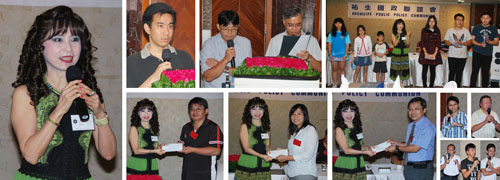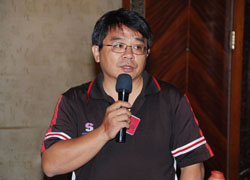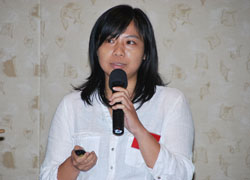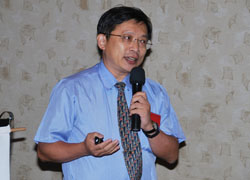Sketch of Public Policy Communion, October 2016
|
2016年10月份國政聯誼會縮影  本會已於2016年10月23日假台北喜來登大飯店地下二樓喜廳舉行「祐生國政聯誼會」。在主持人黃晉英秘書長宣布後揭開當日活動序幕,在輕鬆、活潑的節目過後,隨即由主持人帶來重要訊息:「近來國際上動盪不斷,除了美國總統大選的激烈爭論外,還有菲律賓選擇親中的表態,不但形成國際社會的壓力,並可能進一步造成原有國際關係系統的瓦解。因此,在這動盪不安的改革過程中,祐生藉由國政聯誼會傳達國政委員對於政策的執行內容,讓祐生成員與下世代見習生們能循序漸進,為國家社會做出正確的決策。另外,在氣候異變下的影響下,原本應秋高氣爽的10月份仍有著劇烈的溫差變化,因此,林俊興董事長仍提醒大家「保守、保守、再保守」,使能因應未來瞬息萬變的環境。」 The October Archilife Public Policy Communion of 2016 was held on October 23, 2016. After a series of relaxing and fun activities, Secretary General Huang Chin-ying made the following announcement, "The world has fallen into turmoil recently. In addition to the fierce debate in the US Presidential Election, the pro-China stance of the Philippine's president not only put the international community under tremendous pressure, but may also cause disintegration of the international relations system. Therefore, in this turbulent time, Through the Public Policy Communion, Archilife conveys the policies of the Public Policy Team to educate the members and interns of Archilife and prepare them to make the right decisions for the nation and society. Furthermore, under climate change, serious temperature fluctuations are still occurring in October. President Lin Chun-Hsing would like to remind everyone to stay "conservative, careful, cautious", so that everyone can cope in the violently-changing environment in the future."  緊接著進行專題演講,由國政會委員高傳棋先生主講「傳統建築群落裡的生態設計與文化資產」。主講人首先講述文化資產中蘊含著許多先民的生活智慧,唯有在地子民透過實際行動傳承給下一代,才能開花結果。主講人也與大家分享萬華附近的地理景觀─加蚋仔堀仔頭已提報登錄文化景觀,並在訪問高而潘建築師的過程中,領悟到規劃傳統建築聚落的智慧。接著主講人提到其創立之「臺北水窗口」,期望藉此來深耕活化臺北老城街區。主講人並介紹了首創的萬華大富翁桌遊,從遊戲中達成傳承文化的目的。最後,期望引領社區皆能朝向真而後善、善而後美的目標前進。 緊接著進行專題演講,由國政會委員高傳棋先生主講「傳統建築群落裡的生態設計與文化資產」。主講人首先講述文化資產中蘊含著許多先民的生活智慧,唯有在地子民透過實際行動傳承給下一代,才能開花結果。主講人也與大家分享萬華附近的地理景觀─加蚋仔堀仔頭已提報登錄文化景觀,並在訪問高而潘建築師的過程中,領悟到規劃傳統建築聚落的智慧。接著主講人提到其創立之「臺北水窗口」,期望藉此來深耕活化臺北老城街區。主講人並介紹了首創的萬華大富翁桌遊,從遊戲中達成傳承文化的目的。最後,期望引領社區皆能朝向真而後善、善而後美的目標前進。Next on the schedule was the keynote speech. First, Mr. Gao Chuan-chi, presented a speech on the "Ecology Design and Cultural Heritage in Traditional Architecture Clusters". The speaker began from the wisdom of our forefathers hidden in the cultural heritage and how such wisdom can sprout into cultural treasures through educational activities by the local residents. The speaker also presented the landscape of an area near Wanhua-Juezaitou of Kala, which has been nominated for its cultural landscape. He shared that he saw the wisdom in the planning of traditional architecture clusters in the process of interviewing the Architect, Gao Er-pan. The speaker continued to introduce the "Taipei Window of Water", which is expected to revive the streets of old Taipei. Mr. Gao shared the first Monopoly game designed for education of the heritage of Wanhua. Finally, he expressed his goal to lead the communities into development of a society with truthfulness, goodness and beauty.  接著由國政會委員吳郁娟小姐主講「巴黎氣候協議生效後之國際減碳趨勢」。主講人首先提到2015年11月巴黎於恐怖攻擊之後兩周舉辦了聯合國氣候變遷大會,在同聲譴責恐攻的同時,吐瓦魯總理提出了另一觀點:「為何人們懼怕恐攻,卻無視氣候災難?」,使各國群起覆議。會議的談判焦點在於控制全球升溫1.5度、災害與損失賠償,以及每五年回顧各國減緩成效。主講人進一步分享談判現場為24小時無休,過程需具備良好的策略與體力。最後主講人提到民調顯示,有六成國人並未聽過巴黎氣候協議,顯示資訊來源的缺乏,期望日後能有更多的公開資訊,讓更多人重視氣候變遷的問題。 接著由國政會委員吳郁娟小姐主講「巴黎氣候協議生效後之國際減碳趨勢」。主講人首先提到2015年11月巴黎於恐怖攻擊之後兩周舉辦了聯合國氣候變遷大會,在同聲譴責恐攻的同時,吐瓦魯總理提出了另一觀點:「為何人們懼怕恐攻,卻無視氣候災難?」,使各國群起覆議。會議的談判焦點在於控制全球升溫1.5度、災害與損失賠償,以及每五年回顧各國減緩成效。主講人進一步分享談判現場為24小時無休,過程需具備良好的策略與體力。最後主講人提到民調顯示,有六成國人並未聽過巴黎氣候協議,顯示資訊來源的缺乏,期望日後能有更多的公開資訊,讓更多人重視氣候變遷的問題。Next, Miss Wu Yu-chuan, spoke on "Trends of Carbon Reduction in the Work after the Paris Agreement (Accord de Paris)". The speaker began from the UN Climate Change Conference two weeks after the terrorist attack in Paris in November 2015. While the world leaders condemned the act of terror, the Prime Minister of Tuvalu raised another point: Why do people fear terrorist attacks, but ignore the disasters brought by extreme climates? The world leaders echoed his claim. The Conference focused on how to control global warming, when the temperature worldwide is raising an average of 1.5°C, the disasters, indemnity for the damages and the effectiveness of carbon reduction in the past five years. The speaker further shared her experience on-site of the negotiation. She said that the negotiation went on for 24 hours non-stop, so good strategy and physical fitness would be essential to go through the process. Finally, the speaker mentioned that a recent survey shows that 60% of the people in Taiwan have never heard of the Paris Agreement. This shows that sources of information are lacking in this country. She expects more information will become available to the public to raise public awareness on climate change.  接著由國政會委員王文安先生主講「智慧環境與智慧生活觀察」。主講人首先提到智慧數位時代的來臨,表現在各個面向,舉例來說有農田水利雲端監控系統的產生,並且有能偵測人體生理訊號提供即時的醫療警訊的智慧衣,以及手機遠端操控家電等。主講人接著提到智慧綠生活實踐案例:在上海有以智慧型居家管理,醫養整合的養老社區;在東京的智慧社區,則為擁有共用工作空間的智慧綠環境與綠建築之整合住宅;在東京另外有利用雲端─富士通物聯網IOT技術,達成專業智慧化結合。最後,主講人表示智慧環境之蛻變需藉由更落實的整合,以邁向更美好的未來。 接著由國政會委員王文安先生主講「智慧環境與智慧生活觀察」。主講人首先提到智慧數位時代的來臨,表現在各個面向,舉例來說有農田水利雲端監控系統的產生,並且有能偵測人體生理訊號提供即時的醫療警訊的智慧衣,以及手機遠端操控家電等。主講人接著提到智慧綠生活實踐案例:在上海有以智慧型居家管理,醫養整合的養老社區;在東京的智慧社區,則為擁有共用工作空間的智慧綠環境與綠建築之整合住宅;在東京另外有利用雲端─富士通物聯網IOT技術,達成專業智慧化結合。最後,主講人表示智慧環境之蛻變需藉由更落實的整合,以邁向更美好的未來。Next, Mr. Wang Wen-an, spoke on "Observation on Smart Environments and Smart Living". The speaker began his presentation from the arrival of the smart digital era and applications in different aspects. He gave several examples, including the irrigation cloud system, smart outfits that monitor bio-signals and provide instant alerts for medical treatment, and remote control of home appliances. The speaker continued to illustrate his views through actual case scenarios, including a retirement community in Shanghai integrating medical and health care into smart home management, a smart community in Tokyo that has shared green work spaces in a green building, and a cloud-enabled community using Fujitone IOT technology to achieve a professional network of smart applications. Finally, the speaker said that more effective integration will bring smart environments into a revolutionary stage and bring the lives of mankind into a better future. 演講完畢,黃晉英秘書長代表基金會致贈謝禮予主講人。接著在與會者紛紛利用「餵豬時間」提出個人意見與看法互相交流後,圓滿地結束十月份國政聯誼會。 After the speech, Secretary General Huang Chin-ying presented a gift to the speakers on behalf of the foundation. Then, attendees expressed and exchanged their opinions and views during the piggy hour. The October Archilife Public Policy Communion ended smoothly. |

